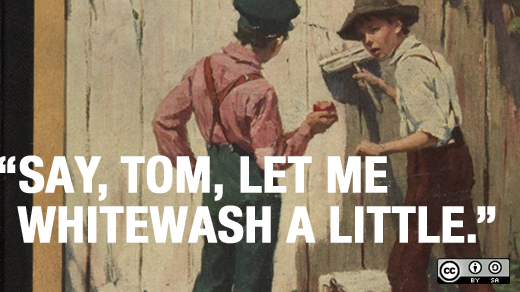In this article, I would like to discuss the scene where Tom Sawyer, the hero of “The adventures of Tom Sawyer”, by Mark Twain, literally persuades his peers to, believe or not, pay him to do the task that his aunt Poly assigned to him as a form of punishment that he had to carry out on a Saturday morning.

Tom Sawyer, whitewashing fences, and building communities online was originally uploaded by opensource.com on Flickr, and is reused here under the terms and conditions of the Attribution-ShareAlike 2.0 (CC BY-SA 2.0) Creative Commons license
Although Tom Sawyer is a fictional hero, many have praised this extraordinary skill of his to motivate and put people to work, which is a rare and extremely sought after commodity in the modern business environment.
And, since he was only a kid when he managed to persuade other children to do what he wanted them to do for him, it can be safely assumed that nobody taught him this skill but he was rather born with it.
On the other hand, his half-brother, Sid Sawyer, would never follow Tom’s “strategy” to literally fool other kids and Aunt Poly alike, because he was a boy that strictly adhered to rules and would never think of cutting corners, like Tom did.
It is clear that, if Tom and Sid were actual persons and were involved in the day-to-day management of a modern business, they would apply totally different management styles.
At this point, I would like to highlight that Mark Twain perhaps favors Tom’s approach to achieving things while going around rules, more than Sid’s “good-kid” approach.
Or, Mark Twain could be imperceptibly ironic and sarcastic in praising how Tom Sawyer motivated other people in such a “smart” way, whereas Sid would always be the dull boy who could not live without rules.
In the end of the day, if Tom could do this at his age, can you imagine what great feats he would achieve as a grown man?
To be honest with you, I am scared to even think about it…
That is because, although it is great for someone to have an extraordinary skill, such as be an outstanding persuader and motivator of people, the question remains whether this special skill is used for ethical reasons, and this is, I believe, a key point in the whole discussion.
The point is not whether Tom’s “innate talent” approach beats Sid’s “meticulous student” approach, or whether life experience and born-with talent prove to be more effective than academic study.
In either case, the critical question is whether effectiveness and the ability to achieve things is followed by another “inherent talent”; that of innate ethics.
This article was originally uploaded by me to Medium.com
You can read it here
Thank you for a wonderful stimulus to the discussion!
Apart from the fact that I can't imagine innate ethics (rather innate ability to behave ethically), Tom is already a kind of shrew who would later have become a marketing strategist. Sid, on the other hand, is for me not rule-governed and exemplary, but rather a cowardly crouching coward.
Downvoting a post can decrease pending rewards and make it less visible. Common reasons:
Submit
Thank you, friend!


I'm @steem.history, who is steem witness.
Thank you for witnessvoting for me.
please click it!
(Go to https://steemit.com/~witnesses and type fbslo at the bottom of the page)
The weight is reduced because of the lack of Voting Power. If you vote for me as a witness, you can get my little vote.
Downvoting a post can decrease pending rewards and make it less visible. Common reasons:
Submit